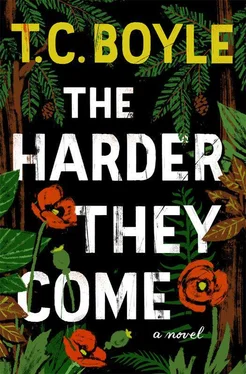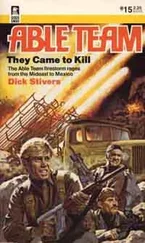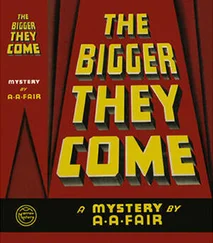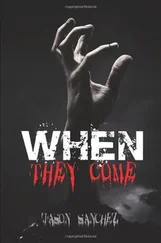The cop just stared at her. After a moment he flipped up his sunglasses so she could see the fine red fissures of irritation fracturing his frog-belly eyes. “Maybe you didn’t hear me,” he said, “but I asked for your license and registration.”
She said nothing. Just fixed her gaze straight ahead to where the road ran on into the sunshine past a field of stiff yellow grass and a shadowy fringe of trees, the road that ran true to her destination, to the place where she had business when she had no business here at all.
“Ma’am?”
She turned her head back to him, locked her eyes on his, and her heart was going, all right, because she could tell where this was leading and it scared her and made the anger come up in her too, and why couldn’t they just leave well enough alone? “I told you,” she said, “I have no contract with you.”
“Does that mean you refuse?”
“Let me repeat,” she said. “I — have — no — contract — with — you.”
He shifted his boots in the gravel along the roadside, a dull grating intolerable sound that got Kutya back up into the high register. The cop put his hands on his hips, as if to show her where the gun was and the nightstick and handcuffs too. He said, “I’m going to have to ask you to get out of the car.”
“No,” she said. “I won’t.”
“Suit yourself.” He straightened up then and stalked back to his car, where she could see him in her rearview as he leaned in, pulled out the cord of the radio mike and started moving his lips.
Ten long minutes crept by. Each one of them, each second, dripped acid through her veins, and she thought of just putting the car in gear and driving off, but resisted because that would only make things worse. Kutya — he was a puli, a white puli — settled into the discolored basket of his dreadlocks and fell off to sleep, thinking the threat had passed. Foolishly. But then he was a dog, and dogs had other concerns.
Finally another cruiser appeared, lights flashing, siren screaming, swooping on up the road behind her like a black steel shroud and nosing in at an angle so close to her front bumper she thought it was going to hit her. In the next instant she was staring across the passenger’s seat of this new car and into the face — the hard demanding unforgiving put-upon face — of a female officer, who picked something up off the seat, squared herself and swung out of the car. Next thing she knew, both cops were there, one on either side of her, and Kutya was back on his feet, back at it again, barking in a renewed frenzy that just made everything that much harder.
“Good afternoon,” the female cop said, her eyes roaming over the interior as if she was thinking of making an offer on the car. “I understand that you refuse to comply with Officer Switzer’s request for identification, is that right?”
She said nothing.
The female officer — she was tall, thin, no shape to her at all, and she wore no makeup, not a trace, not even lipstick — asked her to get out of the car. Or no, commanded her.
She said nothing.
“Just to be sure you understand me,” the male cop cut in now — he was stationed by the passenger’s-side window, leaning in so he could watch her, and if that didn’t make her feel paranoid she couldn’t imagine what would because this was like being squeezed between two pincers and it was wrong, intolerable, a violation of every natural right there was—“I have to inform you that state law requires you to show a valid driver’s license, registration and proof of insurance at the reasonable request of a peace officer.”
She threw it right back at him. “ Reasonable? You call this reasonable? You have no authority here — you’re nothing more to me than a man dressed up in a Halloween costume.”
“If you refuse,” he said, the muscles tightening around his mouth, “we will have no recourse but to remove you forcibly from your vehicle—”
“Which will be impounded,” the female added, as if they’d switched speakers on a stereo, his voice assaulting her on the right, hers on the left. “And your dog will be taken to the shelter.” She paused. A top-heavy camper swished delicately past them, ten miles under the limit. A pickup going the opposite way swung with elaborate courtesy off onto the shoulder to give it room and then continued on in a slow-motion crawl. “And you yourself, if you don’t comply this minute, will be arrested, I promise you that — and I personally will escort you to the county jail.”
It was hopeless, she could see that. The day was ruined. The week, the whole month. This was the mega-state in all its glory. She’d stated her status in plain English and they still didn’t seem to understand. Well, they could go to hell, all of them. She started screaming then, calling them every name in the book, shouting “TDC! TDC! Threat, Duress and Coercion!” over and over again, even as the female forced open the door and took hold of her by her left arm and Kutya, good dog, faithful dog, went right at her.
They took her to the county jail in Ukiah, retracing her route back up Route 20, though now she was in restraints and in the backseat of a police cruiser, separated by a heavy wire grid and Plexiglas shield from the female cop, whose right hand, resting at one o’clock on the wheel, sported two bright shining flesh-colored bandaids where the dog’s teeth had broken the skin, though it wasn’t much more than a scratch. Her own car was back alongside the road, awaiting the tow truck, and Kutya — poor Kutya — after having been poked, prodded and muzzled by two numbnuts from Animal Control, had been forced into a boxy white van, which must have been somewhere behind her now, on its way up this same road to the animal shelter, also in Ukiah. She’d missed her appointment, of course — and for what, for nothing, for a seatbelt? — and she’d had no way of letting the Burnsides know she wasn’t coming, that she’d been unavoidably and illegally detained and wasn’t just blowing off her responsibility, and who could blame them if they went online and found another farrier to shoe their horses and trim the hooves of their sable antelope? She had a reputation to maintain, a business to run, and she was doing no harm to anybody, doing nothing more than using the public byways as was her inalienable right, and now look at the mess she was in.
Still, as the cruiser looped through the turns and climbed back up out of the Noyo Valley, she began to rethink her position, until degree by degree she felt the indignation cooling in her. This was going to cost her. Fines, towing and Christ knew what else. They’d make her renew that sticker, and there’d be paperwork, a layout of cash she really didn’t have and every sort of hassle the authorities ( authorities, what a joke) could devise. By the time they arrived at the police station and they’d photographed and fingerprinted her, given her her one phone call — to Christabel, who else? — and escorted her to an empty cell and locked her in, she was contrite. Or no: chastened was a better word. And enlightened. Enlightened too. These people didn’t recognize her status, didn’t know a damned thing about the Uniform Commercial Code or her rights under it, and they didn’t care either. They had all the power, all the muscle, and she was nothing, reduced to this, to groveling and ass-kissing and giving lip service to the System, as if she was grateful they’d assaulted her and taken away her rights and her property. All right. If that was how they wanted it, fine. She sat in that cell and kept her mouth firmly shut and fed her hate and resentment till Christabel showed up an hour later with the bail money and she was out.
“I told you,” Christabel said, once they’d slammed into her pickup in the lot out back of the station. “You may have your theories or beliefs or whatever, but these people? They don’t care. They’re on another planet — this planet, planet earth.” She gave her a look, all eye shadow and glistening black mascara. “And you — you’re in outer space. I mean it, Sara. I really do.”
Читать дальше












